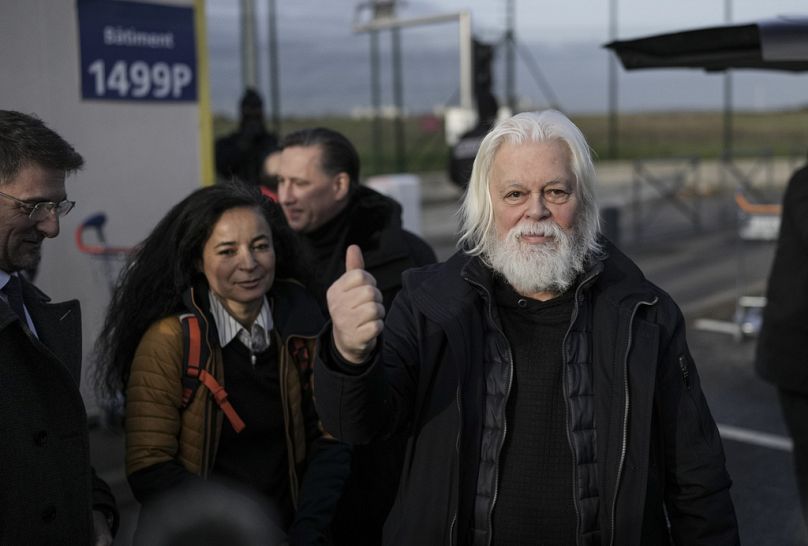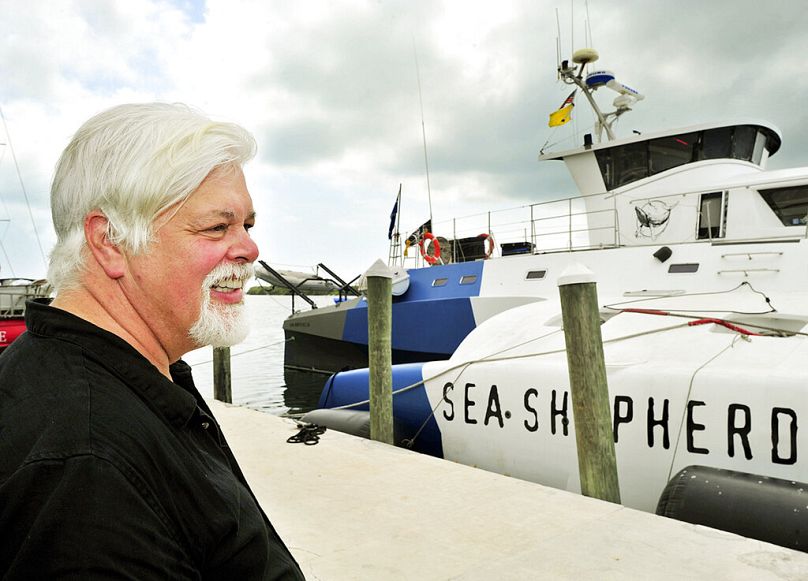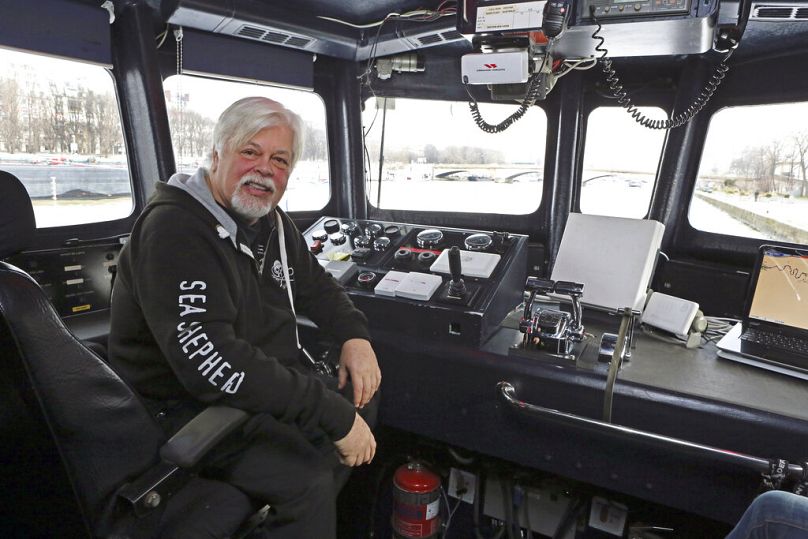‘If the oceans die, we die’: Anti-whaler Paul Watson on activism, prison and not giving up hope

Paul Watson’s passion for the sea can be traced back right to the start of his life - and it’s a love affair which has continued ever since.
The founder of the Sea Shepherd Conservation Society, a direct action group focused on marine conservation activism, he was raised in a fishing village in eastern Canada and was so enchanted by the ocean that he “ran off” aged 17 to join the Canadian coast guard.
Over the course of his career, he’s been faced with all manner of challenges, from dangerous storms to confrontations with whalers. He’s also been shot at and had his boat rammed - but none of it has stopped him.
Obstacles also include time spent in jail. At the end of 2024, he was released from prison in Greenland where he had spent five months in custody after Denmark rejected a Japanese request to extradite him.
Watson had been detained by police when his ship docked in Greenland's capital, Nuuk. The force was acting on a 2012 Japanese warrant which accused him of causing damage to a Japanese whaling ship, injuring a crew member during an encounter in Antarctic waters, and obstructing business in 2010.
He denied all the charges and Denmark, which oversees the autonomous territory of Greenland, refused to comply with the extradition request, citing "the nature of circumstances" and the fact that the incident dated back some 14 years.
This came as a great relief to Watson, who’s spent his entire life undertaking marine conservation work.
A special encounter with a sperm whale changed the course of Watson’s life
At the age of 21 in 1971, Watson was a co-founder of Greenpeace and, now aged 74, he tells Euronews Green that it was an encounter with a harpooned sperm whale in 1975 which spurred him on to fight to bring whaling to an end.
“As the whale came out of the water, I looked into his eye and I saw my own reflection in that eye, but I also saw understanding,” he reminisces.
“The whale understood what we were trying to do, and instead of coming forward and crushing us, he began to slide back and made a big effort in doing so. He could have killed us and chose not to do so.”
It was this meeting which made Watson so passionate about his work.
“I said to myself ‘Why are they killing these whales? They're killing them for oil which powers intercontinental ballistic missiles. Here we are killing this incredibly beautiful, intelligent, self-aware, sentient being for the purpose of making a weapon meant for the mass extermination of human beings. And that struck me as insane.”
Since then, he’s dedicated himself to protecting as many of their kind as he possibly can, as well as safeguarding the biodiversity of the sea as a whole.
“If the oceans die, we die. It's as simple as that,” he says.
Watson urges everyone to defend the environment in the face of opposition
Watson’s passion for saving the whales and the ocean has, infamously, won him a number of enemies, with some going as far as to call him an ‘eco-terrorist’.
That epithet is something he refutes entirely.
“In my entire life, I've never caused an injury to anybody. I've never been convicted of a crime. So the word terrorism is used very freely. These days, if you disagree with somebody, you’re a terrorist,” he says.
Despite the insults thrown his way, he’s determined to keep fighting for the rights of the flora and fauna which can’t protect itself - and hopes more people will follow suit as we enter a new year.
“People are going to rise up and defend the environment and to defend their basic rights,” he says.
Watson is concerned, though, that many government’s responses will be to oppress protestors.
“We can’t do the things we did in the 1960s, ‘70s and ‘80s because the governments of the world have become more repressive,” he adds.
France welcomes Watson after his release from custody
The French government, all the way up to president Emmanuel Macron, have been very supportive of Watson’s work, though.
Watson arrived in the country following his release from the Greenland jail and has applied for citizenship.
He thinks that France has the right idea when it comes to environmentalism - and is not surprised much of the country has supported his cause.
“It has a long history of marine conservation, going back to Jules Verne and then Jacques Cousteau. People in France are interested and concerned about what's happening to our oceans and that history speaks for itself,” he says, “so I think that was one of the motivating reasons why I've gotten so much support in France.”
He’s typically self-deprecating about this support, though: “You know, I don't look at it as coming to my support personally, but more for the support of a cause, which is the protection of our ocean,” he says.
Nevertheless, he is glad that the French government is, unlike other nations, taking climate change and the importance of the oceans seriously.
“Governments are beginning to realise that this is something serious that has to be dealt with,” he says.
He’s also a big advocate for taking individual responsibility for the world around us.
“Each and every one of us has the power to make a difference, to change the world,” Watson urges. “Don't let anybody deter you from doing what you're passionate about.”
Watson is hopeful that whaling will come to an end sooner rather than later
Very few nations still hunt whales, with Norway, Iceland and Japan the only exceptions.
The latter is by far the most prolific killer of whales, having caused the deaths of 507 of the creatures in 2023.
Conservation groups and individuals have heavily criticised the very practice of whaling and eating whale meat, but officials in Japan continue to argue that it is part of the country's culture and way of life, and that they have no intention of stopping it.
Although Watson is clearly very unhappy with this situation, he’s not giving up hope.
“When I began protecting whales in 1974, there were many, many whaling nations. Since then, we've seen Australia, Chile, South Africa, Peru, so many countries that stop whaling - about 90 per cent of countries have stopped it,” he says
“I'm pretty confident we'll shut down Iceland within the next year or so, and if we shut down Japan, then Norway will go with it because Norway only kills whales to sell to the Japanese anyway.”
Regardless of the opposition he continues to face, he is not giving up.
“This is not something that's achieved overnight. You just constantly have to keep at it. And after 50 years, I think we've achieved a lot.”
As to his legacy, though, he’s very much focussed on his work as opposed to his reputation.
“I think that I just want to be remembered as somebody who was very passionate about saving our ocean and life in our ocean,” he says, “Hopefully I can pass that mindset onto future generations to continue that important work.”
Yesterday




